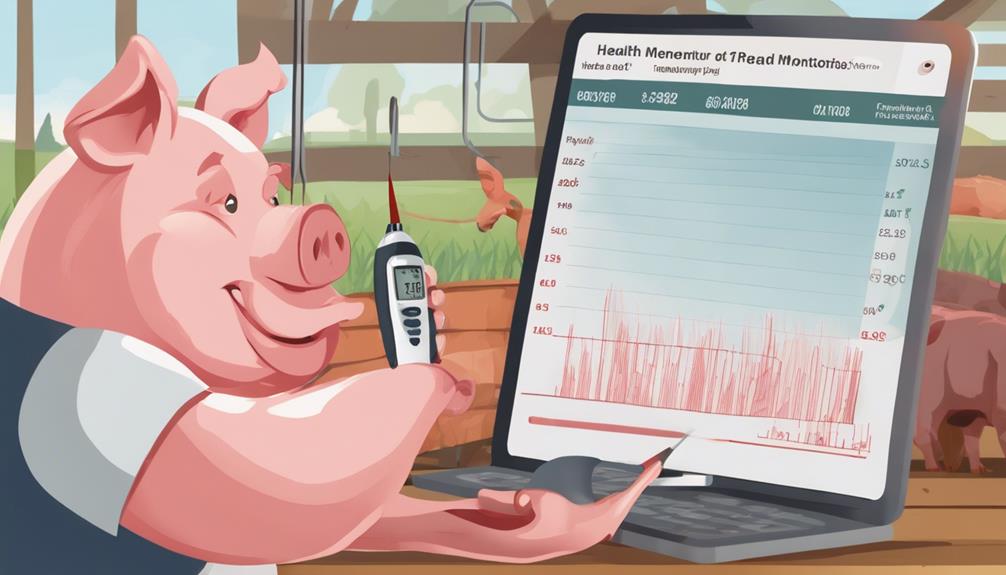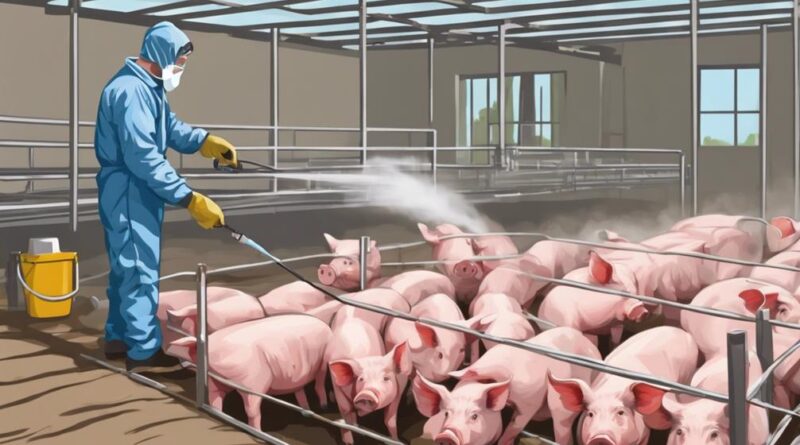7 Budget-Friendly Strategies for Pig Biosecurity
When it comes to safeguarding your pig farm, penny-pinching doesn't have to mean compromising on quality. By adopting these 7 cost-effective strategies for pig biosecurity, you can bolster your defenses without breaking the bank.
From easy-to-implement access controls to the smart utilization of natural remedies, there are practical steps you can take to protect your livestock and your bottom line.
Stay tuned to discover how these budget-friendly tactics can help fortify your farm against potential threats and ensure the well-being of your pigs.
Understanding Pig Biosecurity Basics
To effectively implement pig biosecurity measures, understanding the basics is crucial. Disease prevention is at the core of biosecurity protocols for pig farming. By grasping the fundamentals, you can significantly reduce the risk of disease outbreaks and safeguard the health of your pig herd.
Biosecurity protocols encompass a range of practices aimed at preventing the introduction and spread of diseases within your pig farm. These protocols involve controlling access, maintaining cleanliness, monitoring health, and managing interactions with other farms or animals. Implementing strict biosecurity measures is essential to protect your pigs from potential threats and ensure a healthy environment for them to thrive.
One key aspect of disease prevention is maintaining good hygiene practices. Regularly cleaning and disinfecting pens, equipment, and vehicles can help eliminate harmful pathogens. Additionally, limiting visitors and ensuring that all personnel follow proper biosecurity procedures can prevent the inadvertent transmission of diseases onto your farm.
Monitoring the health of your pigs is also critical in disease prevention. By conducting regular health checks and promptly isolating any sick animals, you can prevent the spread of illnesses throughout your herd. Furthermore, working closely with a veterinarian to establish vaccination schedules and disease monitoring programs can further enhance your biosecurity efforts.
Implementing Controlled Access Measures
Considering the security of your pig farm, how can controlled access measures be effectively implemented to enhance biosecurity protocols? Implementing access control and security measures is crucial to safeguard your pigs from potential diseases and threats. Here are five essential steps to enhance controlled access on your farm:
- Install Secure Gates: Use sturdy gates with locks to control who enters and exits the premises, preventing unauthorized access.
- Implement Visitor Logs: Keep a record of all visitors, including their contact information and purpose of visit, to track who's been on the farm.
- Use ID Badges: Provide all farm employees with ID badges that must be worn at all times to easily identify individuals moving around the premises.
- Establish Biosecurity Zones: Divide the farm into zones with varying levels of access depending on the biosecurity risk, limiting movement between zones.
- Regularly Review Access Protocols: Conduct frequent reviews of access protocols to ensure they're up to date and effective in maintaining farm security.
Utilizing Proper Cleaning Practices
Make sure to consistently implement thorough cleaning practices to maintain optimal biosecurity levels on your pig farm. Proper disinfection is crucial in preventing the spread of diseases among your pigs. To achieve this, start by removing all organic matter and debris from surfaces before applying any disinfectant. Proper disinfection involves using effective chemicals at the correct concentrations. Make sure to follow the manufacturer's instructions for the disinfectants you use and rotate between different types to prevent the development of resistance in pathogens.
Sanitization methods are also essential for maintaining cleanliness on your farm. Regularly clean and disinfect frequently touched surfaces such as door handles, feeders, and waterers. Implement foot baths at entry points to prevent the introduction of pathogens onto your farm. Change the solution in the foot baths regularly to ensure effectiveness. Additionally, establish a designated cleaning area where all equipment and tools are cleaned and disinfected before and after use.
Incorporating proper cleaning practices not only helps prevent the spread of diseases but also creates a healthier environment for your pigs. By following these guidelines for proper disinfection and utilizing effective sanitization methods, you can significantly improve the biosecurity of your pig farm and ensure the well-being of your animals.
Opting for Natural Remedies
Consider incorporating natural remedies as a cost-effective and environmentally friendly approach to enhancing biosecurity on your pig farm. Herbal remedies and DIY solutions can be effective in keeping your pigs healthy and free from diseases without breaking the bank.
Here are some budget-friendly strategies you can implement:
- Garlic Water Solution: Create a natural antibacterial solution by soaking garlic cloves in water and using it to clean pig pens and equipment.
- Essential Oils: Utilize essential oils such as tea tree oil or lavender oil to repel insects and parasites that can harm your pigs.
- Apple Cider Vinegar: Add apple cider vinegar to your pigs' drinking water to boost their immune system and improve overall health.
- Herbal Supplements: Incorporate herbs like oregano or thyme into your pigs' diet to promote better digestion and prevent infections.
- DIY Fly Repellents: Make your own fly repellents using natural ingredients like vinegar, lemon, and eucalyptus oil to keep flies away from your pig farm.
Investing in Biosecurity Equipment
To further strengthen your pig farm's biosecurity measures, investing in appropriate biosecurity equipment is crucial for maintaining a healthy environment for your pigs. Cost-effective solutions can be found for various biosecurity equipment needs. When selecting equipment, consider options that provide the best value for your investment. Look for durable materials that are easy to clean and disinfect to ensure proper biosecurity protocols are met.
Regular equipment maintenance is essential to ensure its effectiveness. Establish a routine maintenance schedule to inspect, clean, and repair equipment as needed. This proactive approach can help prevent breakdowns and minimize the risk of biosecurity breaches on your farm. Proper maintenance also prolongs the lifespan of your equipment, saving you money in the long run.
Investing in equipment such as foot baths, entryway mats, and protective clothing can help prevent the spread of pathogens on your farm. These items create barriers that reduce the likelihood of contamination entering pig areas. Additionally, consider installing hand-washing stations and sanitation equipment to promote good hygiene practices among workers and visitors.
Promoting Good Pig Health Practices
Invest in regular health monitoring and vaccination protocols to ensure optimal well-being for your pigs. This is crucial in preventing diseases and maintaining a healthy herd. By following these budget-friendly strategies for promoting good pig health practices, you can save costs in the long run while keeping your pigs in top condition.
- Feed Management: Provide a balanced diet rich in essential nutrients to support the immune system and overall health of your pigs.
- Vaccination Schedule: Adhere to a strict vaccination schedule recommended by a veterinarian to protect your pigs from common diseases.
- Quarantine Protocol: Implement a proper quarantine protocol for new pigs to prevent the introduction of diseases to your existing herd.
- Disease Prevention: Practice good biosecurity measures such as limiting visitors, cleaning and disinfecting equipment, and controlling pests to reduce the risk of disease spread.
- Regular Health Checks: Conduct routine health checks to detect any signs of illness early and take necessary action promptly.
Monitoring Pig Health Regularly

To maintain the optimal health of your pigs, it's essential to monitor their well-being regularly and proactively. Regular check-ups are crucial in ensuring that any signs of illness or disease are detected early on. By scheduling routine veterinary visits and conducting regular health assessments yourself, you can stay ahead of any potential health issues that may arise within your herd.
Early detection is key when it comes to pig health. By monitoring your pigs regularly, you can quickly identify any changes in behavior, appetite, or physical appearance that may indicate a problem. This allows you to take prompt action, preventing the spread of diseases and minimizing the impact on the overall health of your pigs.
In addition to physical examinations, keep a close eye on your pigs' living conditions. Regularly inspect their housing, food, and water sources to ensure they're clean and free from any contaminants. Maintaining a clean and hygienic environment is essential for preventing the spread of diseases among your pigs.
Training Staff on Biosecurity Measures
Training your staff on biosecurity measures is essential for maintaining the health and well-being of your pigs. Here are some key points to consider when educating your staff on biosecurity measures:
- Staff Education: Provide comprehensive training sessions to ensure that all staff members understand the importance of biosecurity measures and how to implement them correctly.
- Reinforcement: Regularly reinforce the importance of biosecurity practices through reminders, signage, and discussions to keep the information fresh in your staff's minds.
- Practical Application: Encourage hands-on training sessions where staff can practice implementing biosecurity measures in real-life scenarios to enhance their understanding.
- Follow-Up: Conduct follow-up assessments to evaluate staff performance and address any gaps in knowledge or compliance with biosecurity protocols.
- Continuous Improvement: Foster a culture of continuous learning and improvement by providing opportunities for ongoing education and training on new biosecurity developments.
Frequently Asked Questions
Can Pig Biosecurity Measures Also Help Prevent the Spread of Diseases to Other Animals on the Farm?
Yes, pig biosecurity measures can definitely help prevent the spread of diseases to other animals on the farm.
By implementing farm-wide protocols and focusing on cross-species transmission, you can create a safer environment for all your animals.
Consistent monitoring, proper hygiene practices, and isolation of sick animals are key components in reducing the risk of diseases spreading between different species on your farm.
How Can Pig Biosecurity Practices Be Adapted for Outdoor or Free-Range Pig Farming Systems?
When adapting systems for outdoor challenges in pig farming, consider factors like the layout of the land, fencing, and access to water sources.
Outdoor environments may require additional biosecurity measures to prevent disease spread. Implementing protocols for visitor access, equipment sanitation, and pest control can help maintain a healthy environment for your pigs.
Regular monitoring and adjusting biosecurity practices as needed are crucial for success in outdoor or free-range pig farming systems.
Are There Specific Biosecurity Measures That Should Be Taken When Introducing New Pigs to an Existing Herd?
When introducing new pigs to your existing herd, it's crucial to follow proper quarantine protocols. This helps prevent disease transmission and protects the health of your animals.
Implement monitoring procedures to track any signs of illness and ensure herd immunity is maintained. By being proactive in these measures, you can safeguard the well-being of your pigs and maintain a healthy herd.
What Are Some Signs or Symptoms of Common Pig Health Issues That Farmers Should Be on the Lookout For?
When it comes to recognizing symptoms of common pig health issues, it's essential to keep an eye out for signs like coughing, sneezing, diarrhea, lethargy, and poor appetite.
Prevention methods involve maintaining good hygiene, providing a balanced diet, regular veterinary check-ups, and promptly isolating sick pigs to prevent the spread of diseases within the herd.
How Can Farmers Ensure That Their Biosecurity Practices Are Effective in Preventing Disease Outbreaks in Their Pig Populations?
To ensure your biosecurity practices are effective, monitor closely for any signs of disease in your pig populations. Implement prevention strategies like limiting visitors, changing clothes and boots, and disinfecting equipment.
Regularly review and update your biosecurity protocols to stay ahead of potential outbreaks. By staying vigilant and proactive, you can help protect your pigs from diseases and maintain a healthy population.
Conclusion
In conclusion, by following these budget-friendly strategies for pig biosecurity, you can keep your pigs healthy and prevent the spread of diseases on your farm. Remember to always prioritize cleanliness, implement controlled access measures, and invest in biosecurity equipment.
By promoting good pig health practices and monitoring their health regularly, you can ensure a safe and thriving environment for your animals. Don't forget to train your staff on biosecurity measures to maintain a healthy herd.
